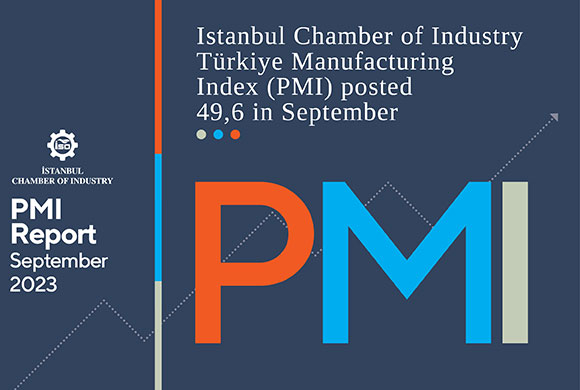News
September 2023 Report of ICI Türkiye Manufacturing PMI and Türkiye Sector PMI Released
- 02.10.2023
- News

The Istanbul Chamber of Industry Türkiye Manufacturing PMI edged up to 49.6 in September of 2023 from 49 in the previous month, signaling a slightly softer moderation in the health of the manufacturing sector, and indicative of business conditions moving closer to stabilisation. Where output moderated, this was generally a reflection of weak market conditions and a slowdown in new orders.
According to the September report of Istanbul Chamber of Industry Türkiye Sector PMI, only one in 10 monitored sectors, the food sector, increased its output. The number of sectors increasing their job creation dropped to three, the lowest since the first wave of Covid-19 epidemic by the beginning of 2020.
The September 2023 period of Istanbul Chamber of Industry (ISO) Türkiye Manufacturing PMI (Purchasing Managers’ Index) survey, which is the fastest and reliable reference accepted in manufacturing industry performance of the economic growth was announced. According to the survey results, where any figure greater than 50.0 indicates overall improvement of the sector, the headline PMI rose to 49.6 in September from 49.0 in August, and signalled only a marginal
moderation in the health of the manufacturing sector. The latest reading was indicative of business conditions moving closer to stabilisation.
The health of the sector softened in the third quarter of the year. Production eased for the third month running, but only marginally and to a lesser extent than in the previous survey period. Where output moderated, this was generally a reflection of weak market conditions and a slowdown in new orders. On the other hand, some firms saw demand hold up over the month. Both total new orders and new export business slowed further in September, but at a softer pace than in August. A common theme among anecdotal evidence from panellists was that price pressures had restricted customer demand.
INFLATION RATE SLOWER THAN IN AUGUST
Input costs continued to rise sharply amid devaluation in Turkish Lira at the end of the third quarter. The rate of inflation was much slower than in August, however, and the weakest overall since May. In turn, the pace of output price inflation also eased markedly from the previous survey period. Latest data pointed to a fractional rise in employment, extending the current sequence of job creation to five months. Some firms highlighted the need for additional workers, but others scaled back staffing levels amid softer new order inflows. Firms continued to moderate their purchasing activity and stocks of inputs amid weakness of new orders, although the respective slowdowns were less pronounced than in August. In purchasing of inputs, manufacturers were faced with delivery delays in September, as has been the case throughout 2023 so far. According to respondents, the latest decline in vendor performance was due to high transportation costs and difficulties importing goods.
‘DATA GIVES A SLIGHT HOPE’
Commenting on the Istanbul Chamber of Industry Türkiye Manufacturing PMI survey data, Andrew Harker, Economics Director at S&P Global Market Intelligence, said: “There were signs of stabilisation in the Turkish manufacturing sector during September as some firms reported that demand had held up well over the month. Although business conditions remained challenging overall, the latest data provide some hope that a return to growth can be recorded before the end of the year. One help to firms in September was a marked easing of inflationary pressures amid some relative currency stability.”
OUTPUT INCREASES IN FOOD PRODUCTS
According to the September report of Istanbul Chamber of Industry Türkiye Sector PMI, only one in 10 monitored sectors, the food sector, increased its output. This is the second consecutive month of increase in output for this sector, with a growth rate the same with August. The sharpest moderation in output was seen in the textile sector with the highest drop since last November.
This deceleration in output was mostly due to the challenges of firms in getting new orders. Besides output, the food products sector also showed the best performance in new orders, while the base metals sector returned to the growth zone after three months of stabilization. The sharpest slowdown was in textile products. And in export, only the chemical, plastic and rubber products sector and the food products sector increased their export.
Input costs softened sharply over the month throughout the sectors. The lowest increase in inflation was in base metals, while the highest is non-metallic mineral products. In turn, prices of final products slowed down in all ten sectors. In food products sector, improvements in demand provided firms with some pricing power, and had the fastest increase in sales prices. On the other hand, due to difficulties in obtaining new orders, textile manufacturers were able to increase their final product prices to a limited extent in September.
3 SECTORS INCREASED THEIR STAFFING LEVELS
Out of ten, the number of sectors increasing their job creation dropped to three, the lowest since the first wave of Covid-19 epidemic by the beginning of 2020. These were food products, wood and paper products and land and sea vehicles. The wood and paper products sector increased its staffing level for the first time in four months. The sharpest decrease in employment levels was recorded in clothing and leather products. Due to the weak outlook in new orders, purchasing activities increased only in food products and base metals in September. While input purchases decreased in eight sectors, the most significant decrease was in textile products.
You can find attached the Istanbul Chamber of Industry Türkiye Manufacturing PMI and Sector PMI September 2023 reports.